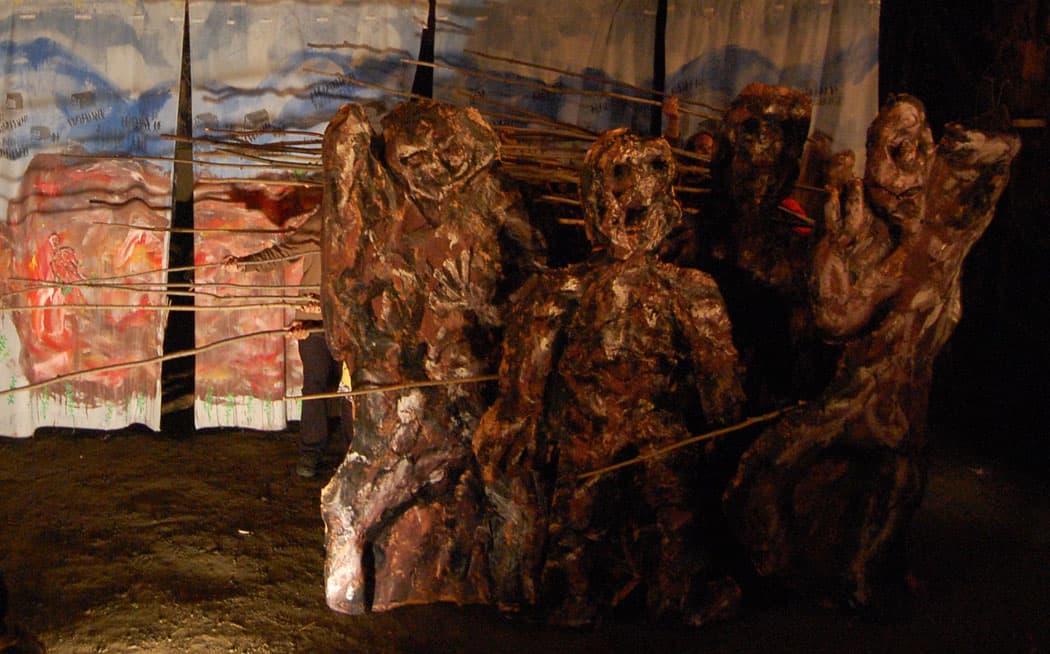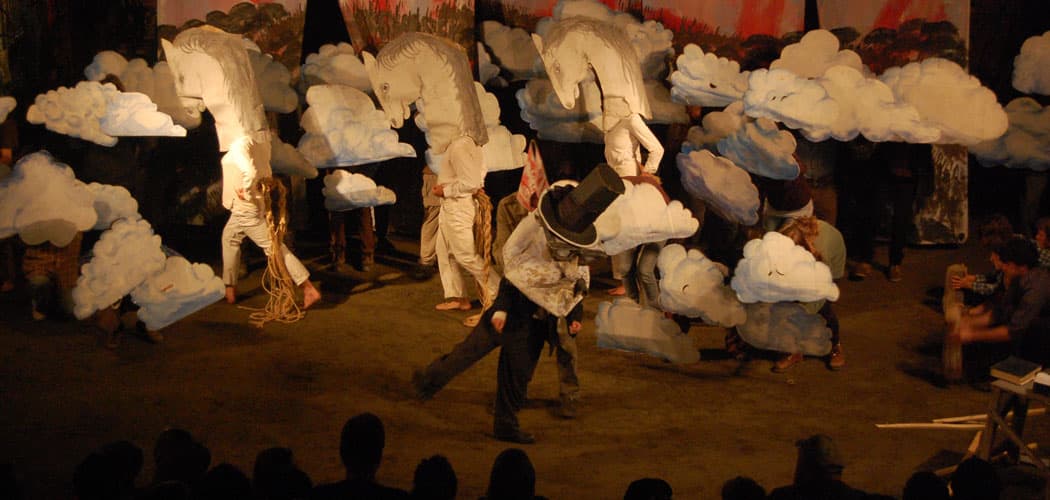Advertisement
Bread & Puppet: How Does Activist Theater Respond To Protests In Our Streets?
“The police brutality that serves the state is very similar in the Greek drama as it is now in America,” Peter Schumann, the founder of Bread and Puppet Theater told me the other day.
We were talking about the dark, condensed version of Sophocles’s 2,500-year-old play “Antigone” that the Vermont troupe is bringing to the Boston Center for the Arts as the opening act of their “Captain Boycott” performances from Jan. 28 to Feb. 1.
And one of the underlying questions ultimately was: How does this longtime activist theater respond to the protests going on in our streets? The answer: By reconsidering history.
The classical Greek drama tells the tale of Antigone, punished by a king for disobeying an edict forbidding the burial of her dead brother’s body after a battle. Bread and Puppet links the tragedy to the Black-Lives-Matter present by describing the deceased as “A body that lays in streets thousands of times, such as Michael Brown.”
“It makes the show more relevant to the moment in which we live,” Schumann said. “So it’s not just a Greek drama, it’s an American drama.”
“This isn’t extraordinary behavior, this is the common behavior of the police,” Schumann went on. “We have people who are gay in the company who’ve gotten punched in the stomach and mistreated by the police arbitrarily. I have seen police action in New York again and again. It seems to be in the first instance you would say humans are not very well suited to be existing with a gun amongst other humans. It empowers them in the wrong way.”

In case it’s not already apparent, “Captain Boycott” is an epic puppet show for grown-ups. (The company will also perform a satirical, family-friendly “The Nothing Is Not Ready Circus” at the BCA on Jan. 24 and 25.)
Bread and Puppet Theater, which was founded in New York in 1963, is known for their tradition of distributing fresh baked bread free to audiences at the end of performances; their monumental, mythic papier-mâché puppets; and their participation in street protests against poor housing conditions, the Vietnam War, nuclear weapons, the wars in Afghanistan and Iraq, American torture. So this show about the long history of abuses of power is right in their wheelhouse.
But the company was also one of the landmark New York experimental theaters of the 1960s—and continues to elaborate their signature blend of vanguard performance, expressionist dance, and folk pageantry.
For the Boston performance of “Captain Boycott,” the company plans to use the Boston Center for the Arts’ vast, round brick Cyclorama to lead the audience into an immersive experience of pastoral landscapes, sleeping people, battles of primordial mud soldiers with spears, “rhythmic movement pieces,” falling-down and rolling-around dances, junk bands, giant puppets, attacking horses, feral clowns, and corpses.
Advertisement

“Captain Boycott” is Schumann’s response to protests that have occurred around the world over the past several years—the Arab Spring, the Occupy movement, Black Lives Matter marches, college tuition hike protests in Quebec, and “boycotting Israeli goods … to cut funding for military and other oppressive actions against Palestinian people,” said Katherine Nook, Bread and Puppet’s projects coordinator and resident puppeteer. “Groups of people standing up and saying, ‘We should have a say. These are our lives.’”
“Captain Boycott” culminates with the tale of an actual 19th century British estate manager in Ireland who became the focus of protests when tenants farming properties he managed refused to harvest crops unless rents were lowered.
“We don’t have that in our common consciousness of the word boycott, that it goes back to this ridiculous event in the 1880s when indeed there was a man called Charles Boycott, who was an oppressive supervisor of Irish potato farmers, himself a Brit, and the farmers didn’t take it any longer,” Schumann said. “They rose up against him, tore him off his horse, virtually.”
“The first two shows” within the show “set up why people need to boycott, what there is to fight back against,” Nook said. “The last show is the history of Boycott, the history of small people, the peasants fighting back against all we need to fight back against.”
Near the end, a narrator declares, “Stop complaining.”
It’s intended as a call to action. “It leaves this idea that Captain Boycott is all around us … but can be defeated by the people, and has been defeated by the people,” Nook said, “and we’re going to continue this dance.”
Greg Cook is co-founder of ARTery. Follow him on Twitter @AestheticResear and be his friend on Facebook.
